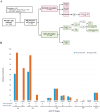Decoding NATALEE and MonarchE eligibility criteria in a real-world cohort of early breast cancer patients
- PMID: 40366335
- PMCID: PMC12076640
- DOI: 10.1093/oncolo/oyaf061
Decoding NATALEE and MonarchE eligibility criteria in a real-world cohort of early breast cancer patients
Abstract
The NATALEE trial expanded the use of adjuvant cyclin-dependent kinase 4/6 inhibitors beyond the MonarchE trial's criteria for early breast cancer (eBC). We conducted a retrospective analysis comparing a large real-world (RW) cohort of 762 consecutive eBC patients with those enrolled in the NATALEE and MonarchE randomized controlled trials (RCTs) to evaluate differences in eligibility. Our analysis revealed that 41.7% of RW patients met NATALEE's eligibility criteria, significantly more than the 21.8% who met MonarchE's criteria, reflecting NATALEE's broader indication. Real-world patients were older, had less advanced tumors, and were less likely to be treated with adjuvant chemotherapy compared to the RCT populations. None of the RW patients was deemed eligible for ribociclib based solely on high genomic risk. These findings underscore significant differences in clinical characteristics and potential treatment eligibility, highlighting the need for critical assessment of RCTs results in clinical practice.
Keywords: NATALEE trial; adjuvant CDKi; early breast cancer; real-world; recurrence score.
© The Author(s) 2025. Published by Oxford University Press.
Conflict of interest statement
None declared.
Figures
References
-
- Loibl S, Marmé F, Marmé M, et al.Palbociclib for Residual High-Risk Invasive HR-Positive and HER2-Negative Early Breast Cancer—The Penelope-B Trial. JCO 2021;39:1518-1530. https://doi.org/10.1200/JCO.20.03639 - DOI - PubMed
-
- Gnant M, Dueck AC, Frantal S, et al.; PALLAS groups and investigators. Adjuvant palbociclib for early breast cancer: the PALLAS trial results (ABCSG-42/ AFT-05/BIG-14-03). J Clin Oncol. 2021;40:282-293. https://doi.org/10.1200/JCO.21.02554 - DOI - PMC - PubMed
-
- Slamon D, Lipatov O, Nowecki Z, et al.Ribociclib plus endocrine therapy in early breast cancer. N Engl J Med. 2024;390:1080-1091. https://doi.org/10.1056/NEJMoa2305488 - DOI - PubMed
-
- Johnston SR D, Harbeck N, Hegg R, et al.Abemaciclib combined with endocrine therapy for the adjuvant treatment of HR1, HER22, node-positive, high-risk, early breast cancer (monarchE). J Clin Oncol. 2020;38:3987-3998. https://doi.org/10.1200/JCO.20.02514 - DOI - PMC - PubMed
-
- Tinterri C, Canavese G, Gentile D.. To dissect or not to dissect? the surgeon’s perspective on the prediction of greater than or equal to 4 axillary lymph node metastasis in early-stage breast cancer: a comparative analysis of the per-protocol population of the SINODAR-ONE clinical trial. Ann Surg Open. 2024;5:e405. https://doi.org/10.1097/AS9.0000000000000405 - DOI - PMC - PubMed
MeSH terms
Substances
LinkOut - more resources
Full Text Sources
Medical
Miscellaneous


